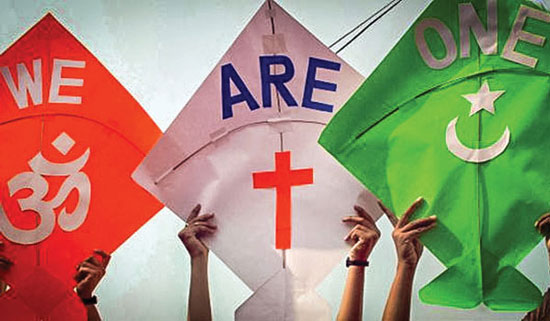Silvio Calzolari, well known Italian orientalist and historian of religions, also brings the MISA case to international attention
We offer in this article the text of the speech by professor Silvio Calzolari, Secretary of FOB (European Federation for Freedom of Belief), held on April 7, 2017 at the presentation of the Acts of the 1st Conference by FOB – Secularism and Freedom of Belief in Italy.
To live in a modern democracy means “leaving together side-by-side” with customs and traditions, beliefs and ideas that we can also frown upon. Even the disapproval is part of democracy. A democratic community consists of individuals able to break free from traditions, from the bonds of blood, from preconceived ideas, from references to the places of belonging and origin and from customs (actual chains of which, often, we are not aware).
This does not mean that our memory or our background should no longer exist; what needs to be removed is the determinism condemning individuals to be what they did not choose to be. Man is a free being and the master of his fate.
We need to guarantee (to ourselves and others) the opportunity to free ourselves from the fate of our origins in order to choose new myths, rituals, alliances, beliefs and religions. To be free in our mind and heart from any external or internal subjection is to be “secular”. It is for this reason, and not by chance, that we chose as the first word of the title of the volume of Acts we are presenting today, the word “Secularism”, well aware of the multiple and sometimes contradictory meanings of the term.
We have used this word in two meanings: one political and the other individual. The political one (who was born when religion instead of uniting men began to divide them) refers to the distinction between the political sphere and religious one (“give to Caesar what is Caesar’s, and to God what is God’s”) and to the subsequent mutual non-interference of the institutions that, somehow, preside over the two realities. This approach assumes a nondenominational State. In Italy, the road to reach this awareness, the separation between Church and State, has been long and full of difficulties.
There is then the meaning that I defined “individual”. In this meaning, it is the individual citizen, professing himself nondenominational, who wants that the laws governing his life have nothing to do with faiths inherited from others, and who does not accept those who have not passed the screening of the individual critical conscience.
Of course, since there are various gradations in the distinction of secularism between the State and the various religious institutions (just think of the differences between French and American secularism), there are several gradations of secularism, ranging from the individual who is open to any religion (secularism as open mind) to the one who doubts about everything (agnosticism), from the one who believes that God, as transcendent being, doesn’t exist, but who respect the faiths and agrees to discuss about them (proactive and positive secularism), to the one who, instead, is sure that God does not exist, that religions are born out of ignorance and that “are all a cheat” (the famous “opium of the people”) to be unmasked (negative secularism; anticlericalism).
You can reach the paradox of believers open to dialogue but unwilling to follow the dictates of the various Ministers (believers who call themselves “secular”, as they feel free from constraints and who are not clerical); and of those who like to call themselves secular, but who are in reality dogmatic and intransigent in their certainties. These are all different views, but all have the right to exist. Because, thanks to heaven, we live in a country that professes itself secular and democratic. And in a democracy, all these various realities, to be guaranteed, must be based on a single element: recognition and respect of the laws of the State (which in itself is an abstract but established element and therefore conventional) that must be equal for all and guarantee the rights of everyone (and also the corresponding duties).
Of course, the principle is only valid if the laws are laws of democracy. I couldn’t talk about democratic laws for example, if a State decides to exclude from the civil and political life an individual or group because their skin is yellow or black, or because they are Buddhists, Hindus, Muslims or whatever. And that brings us to the second word in the title of the book of Acts: “Freedom”.

Democracy has irrevocable principles: respect for minorities, for individual freedom, for the dignity and for the life of each individual, for respect of the freedom to profess own religion, freedom of belief and ideas, the possibility to change own minds, as well as the freedom not to believe. It is necessary to learn to live with the ideological, religious or lifestyle choices with which we disagree (although this does not mean a passive acceptance – or the so-called “political correctness” – of the practices that may go against democracy itself).
In my view this point is fundamental and never enough stressed. In order to adopt the democratic “protection” of one’s faith and one’s way of life, it is essential to adopt democracy itself (secular, pluralistic, protector of individual and collective human rights of men and women alike – and collective).
All freedoms were born from the recognition of these values of secular and nondenominational democracy, including those of criticism and freedom of expression. We must always respect the religious beliefs and ideas of others, although this does not mean that we should always agree. Giving always reason, in order to prove you’re progressives and democrat, is not democratic. To discuss, to argue, to question one, is the basis of any democratic process. But my God-given right to disapprove must not become the right to suppress, condemn or forbid.
It is for reason that FOB was born. Because everyone can be free to believe or not to believe; to work for a better world, in which everyone can peacefully and democratically live (even disapproving or criticizing) one’s religious convictions and one’s way of relating oneself with others and with the transcendent.
Freedom of belief and religion is one of the most important human rights, because it includes freedom of expression, freedom of speech and freedom of association. In our Western world, it would seem a granted right, but it is not at all. In Italy, as in other European countries and in the Western world, is often a theoretical law that exists on paper; it is sanctioned by laws, constitutional rights and charts, but, in the practice, it is sometimes misapplied, if not even openly violated. For this reason, just over two years ago, FOB was born as a secular, nonpolitical and nondenominational initiative to promote and defend freedom of belief and religion, as well as freedom not to believe and to change religious belief. Freedoms that, as mentioned above, are often denied because of prejudice, intolerance and discrimination.
We can find a good example of how the right in question is challenged and in fact limited in the awful, and in our opinion, unlawful habit to label some different expressions of religions or beliefs, as “cults”, and to make them the object of contempt, ridicule and of boor media campaigns.
Another good example is the existence in our countries (for example: in Italy and France) of State or parastatal bodies designed to “counter cults” such as the SAS (Squadra Anti-Sette) and the MIVILUDES (Mission Interministerielle de Vigilance et de Lutte contre le Derives Sectaires). Their existence shows how constitutionally guaranteed rights, in fact, can be thwarted by that State itself.
Not to mention the so-called “anti-cult associations” such as the European FECRIS (European Federation of Centers of Research and Information on Sectarianism), existing in different national contexts, striving to create an atmosphere of suspicion and intolerance, fearing alleged social alarms and dangers of all kinds. Their reports are the “sources” of news, often exaggerated, spread by journalists more interested in possible political benefits and the circulation of their newspapers than in spreading truthful news. It is for this reason that FOB was born: to enhance the primacy of the critical conscience against that of inert and passive obedience.
As stated in the Statute, the European Federation for Freedom of Belief (FOB) is a free association of culture and information independent from parties and religions. The Association is guided by the principles of democratic participation, of solidarity and social development, of autonomy and accountability, and to all the principles on which the EU was founded. It brings together and coordinates the affiliated associations that, over time, have joined the Federation.
The Association takes upon itself the purpose of bringing together in a federation the associations pursuing the same ideal, that of an active participation in the creation of a community of civil societies and States in which freedom of religion and belief is genuine and protected universally in the indivisibility and interdependence of all human rights. As the purpose is universal, as universal are human rights, FOB caters primarily – but not exclusively – to the European States and to those who joined or that will join the European Union, to claim the right of religion and belief as a right that belongs both naturally and for positive law to every human being, on the basis of the principles of equality, non-discrimination and universality.

In these two years of activity, FOB has denounced facts, by us considered extremely serious in all possible ways. Even before the official foundation, in summer of 2014, representatives of FOB successfully strove to get the infamous proposal of MEP Rudy Salles disapproved, who wanted to establish in all Member States unnecessary and harmful “observers on cults”.
Again in 2014, amplifying the voice of the Radical Member of Parliament Marco Perduca, then member of the Radical Delegation of the Democratic Party, FOB raised doubts and denounced the possible unconstitutionality of the Anti-Cult Squad (S.A.S.), which we could almost define some kind of “religious police”, established in 2006 by the Ministry of the Interior.
Again in 2014, FOB alongside other 74 NGOs, put pressure on the Council of Europe so that appropriate measures to protect religious minorities from attacks of ISIS could be taken.
Two months prior to the official establishment, in December 2014, FOB was already enrolled in the Transparency Register at the European Parliament and the EU Commission in Brussels and Strasbourg and, for the second year, and so for every year thereafter, its President Alessandro Amicarelli and some of its representatives have participated in the OSCE Human Dimension Implementation Meeting in Warsaw. FOB recognized itself in the guidelines expressed by the Council of the European Union in FORB, the program of promotion and protection of religion and belief (Luxembourg, June 24, 2013): through its actions it mainly plans to support their application and oppose itself to violations of the principles expressed in the document.
As specified in the text of the Council of the EU, “violations of freedom of religion or belief can exacerbate intolerance and often constitute early indicators of potential violence or conflicts”. It is all the more urgent, therefore, a constant reminder to a Europe which is “impartial and not aligned with any specific religion or belief” in order to protect its citizens from any form of extremism, whether caused by religious sentiments that by anti-religious impulses.
On 26 January 2015, FOB was officially established with its headquarters in Rome. Since that year it has intensified its activities.
On the emotional wave created by terroristic acts, mistakenly called “Islamic”, the media and the authorities of many European countries started to erect physical and mental barriers against Islam and, in Italy, the infamous “anti-mosques” laws made their appearance. FOB, along with its federated associations, cried with a loud voice his dissent by writing to the European supervisory authorities and then launched an online petition that has garnered endorsements from everywhere to ask the Government to oppose such laws, something that took place.
In the meantime we continued to speak to support requests of religious and spiritual groups that were discriminated against and persecuted. As in the case of the absurd trial to the alleged “psycho-cult” Arkeon, which wasn’t one, but that was crushed by the judiciary machine after a media persecution whipped up by various groups, which we have already mentioned, that like to call themselves “anti-cults”. Or, like in the case of the Florentine police investigation, never ended, against MISA Yoga and the farce-trial against its spiritual leader Gregorian Bivolaru.

We acted on every possible occasion in Europe and beyond. For example at Nepal’s authorities to draw their attention to the issue of religious freedom in their country asking to revise part of their new Constitution. Then we joined forces with those of other NGOs to ask the Israeli Knesset to disapprove an anachronistic “anti-cults” law proposed by MPs affected by anti-religious groups in that country. At the same time we promoted an initiative at the United Nations High Commissioner for Refugees (UNHCR), asking them to review the guidelines concerning the Christian refugees in Pakistan.
Back to our country, last year FOB has filed a complaint to the Guarantor for Communications to complain about the lack of religious pluralism existing in RAI TV state television and in all national and international media.
Almost a year after its official establishment, on December 21, 2015, FOB presented itself to the authorities and to the Italian public with a conference held at Montecitorio, in the Hall of Globe, with a carnet already heaped with results from battles conducted in the name of the principles that protect fundamental human rights in relation to freedom of religion, belief and conscience. The Acts of that Conference – Secularism and Freedom of Belief in Italy: reports, proposals, testimonies, have been published by the publishing house Pacini of Pisa, represented here by Dr. Vito Mucaria, (that we thanks), are those which, today, we have the pleasure and honor to present, in this prestigious institutional hall, in this beautiful Hall of Lilies of the Tuscany Regional Council. It’s our first official presentation of the acts, and the choice was not made by chance.
Certainly not because as Secretary of FOB I am a Florentine. The choice was due to the fact that Tuscany has always been at the forefront of the defense of freedom and human rights. Tuscany now is the heir to the Grand Duchy which, two hundred years ago, in November 1786, was the first state in the world to have the courage to abolish the death penalty from its Criminal Code.
I hope that the reading of this volume of documents might help to promote the debate on freedom of religion and belief, true antidotes against all forms of fanaticism or intolerance.
Silvio Calzolari
yogaesoteric
May 22, 2017
Also available in:
 Română
Română
